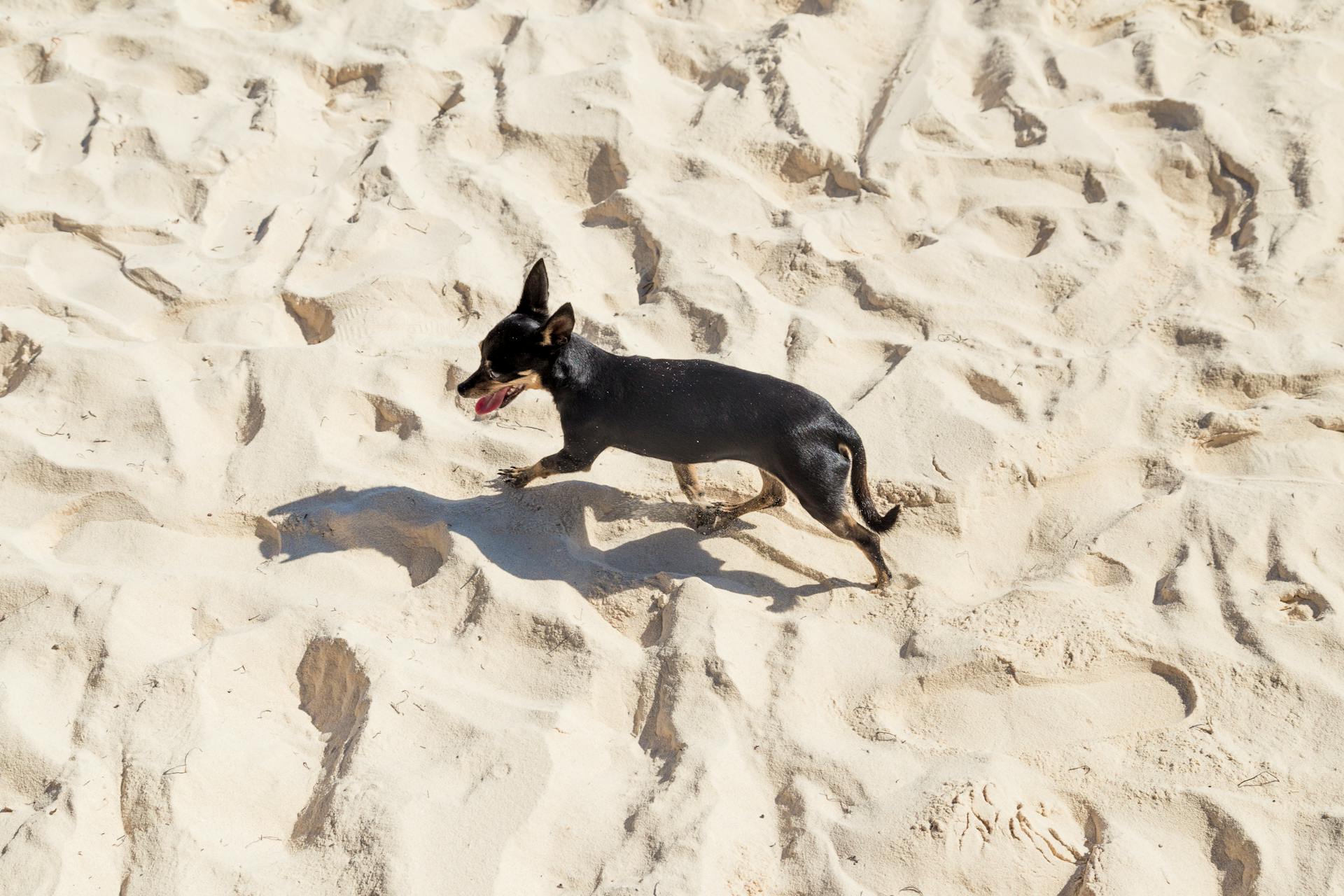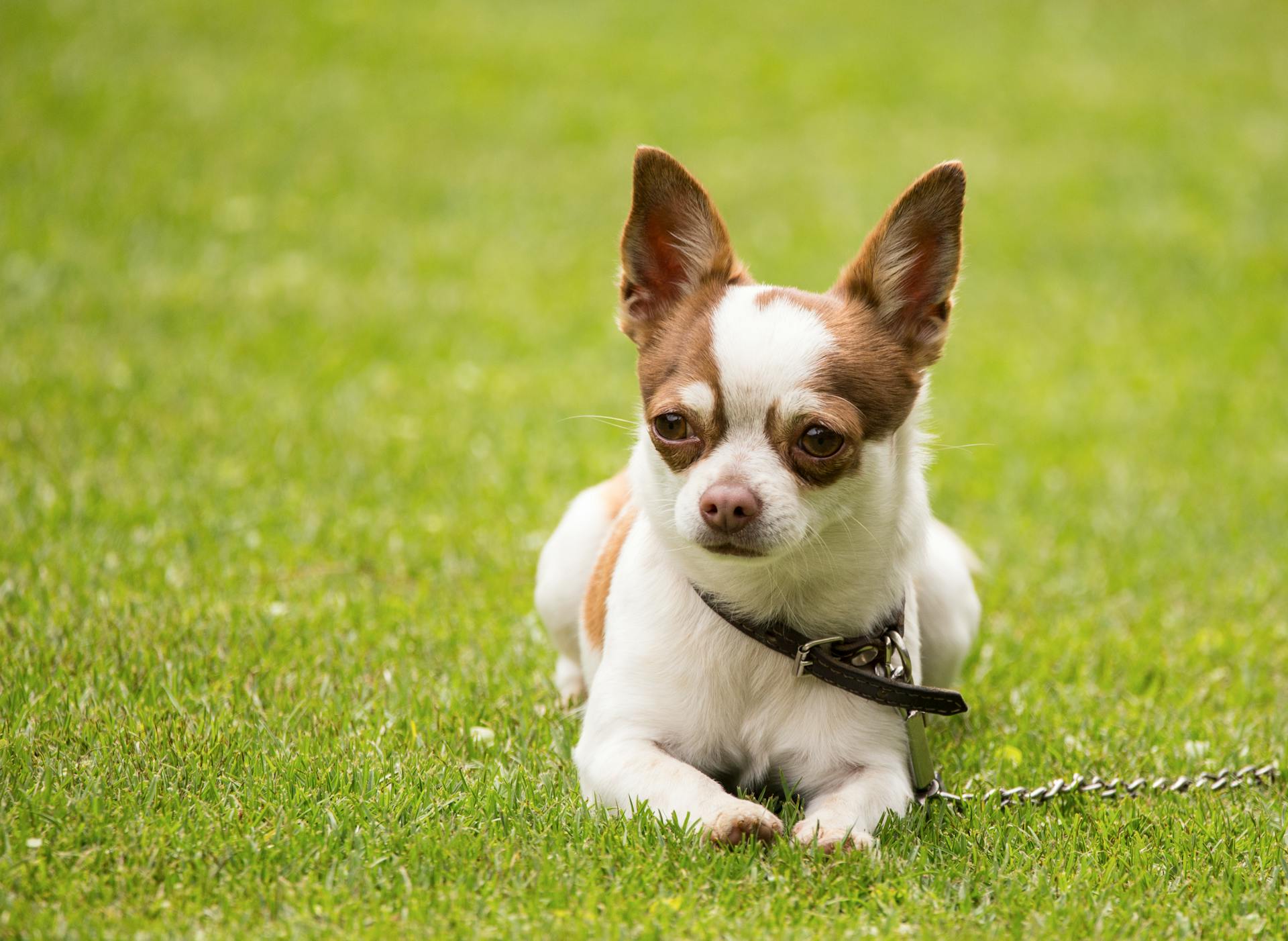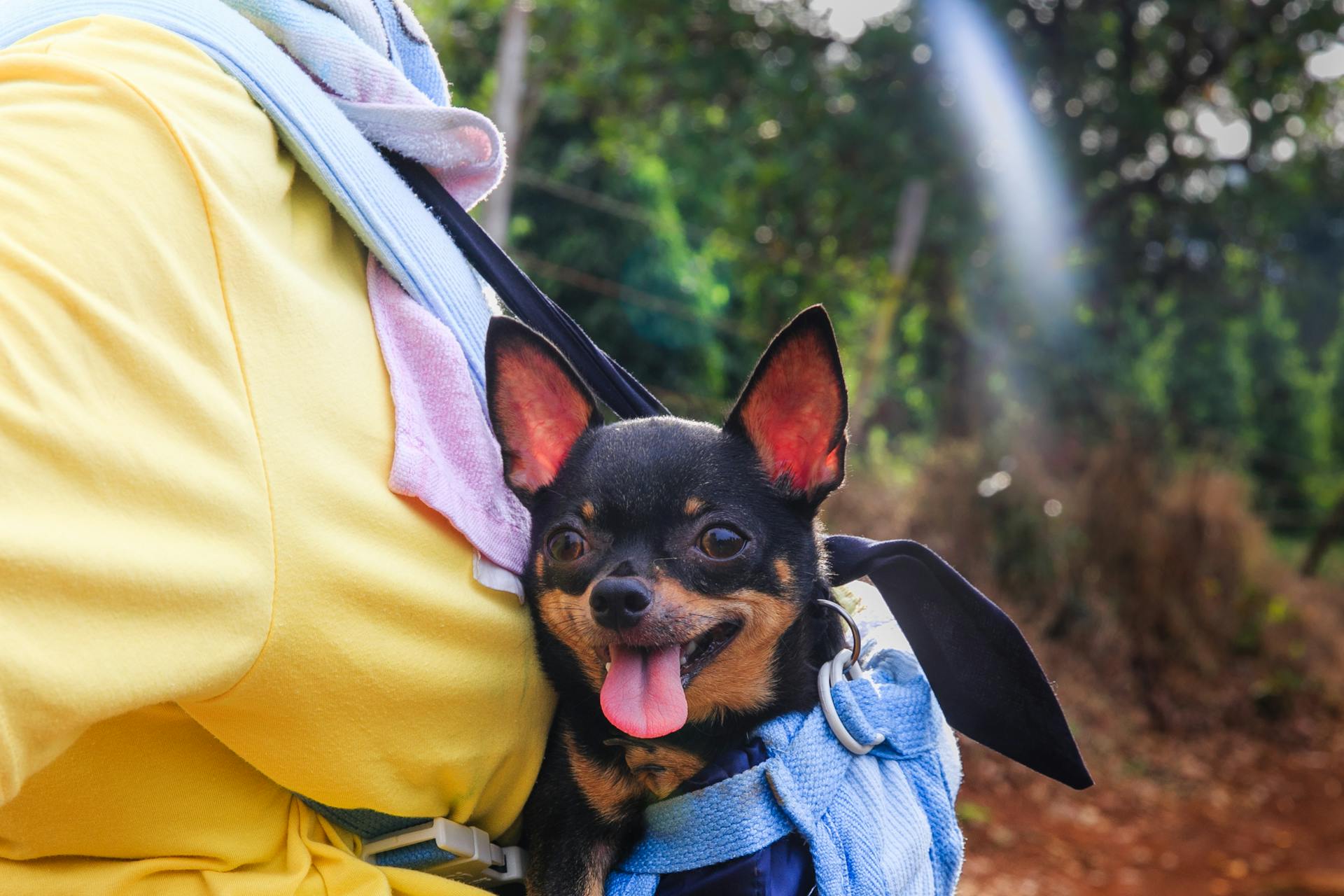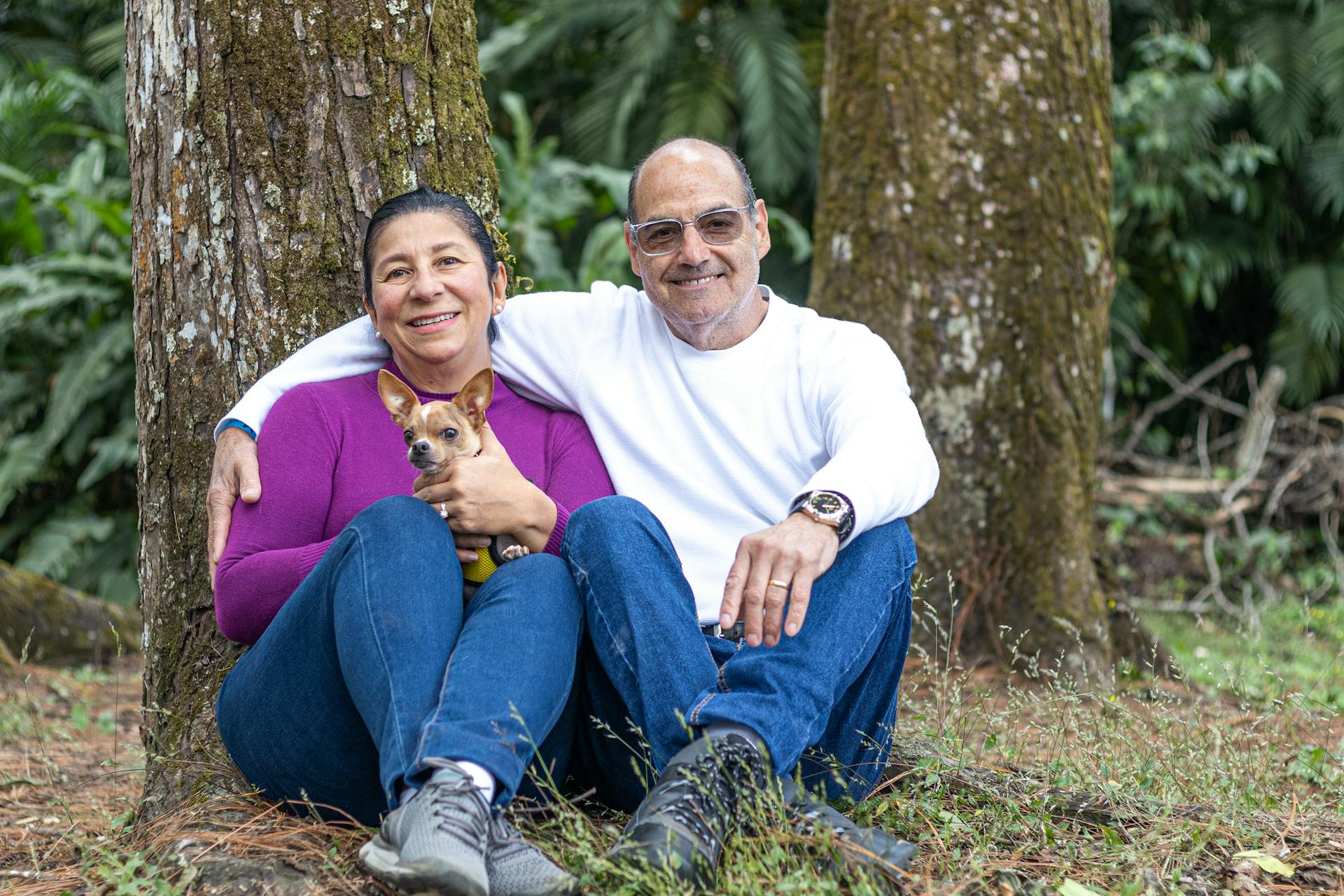
Chihuahuas can make great pets, but like any breed, they have their own set of health concerns.
Chihuahuas are prone to hypoglycemia, a condition that occurs when their blood sugar levels drop too low. This is especially common in puppies under 4 months old.
Chihuahuas are also at risk for heart problems, including murmurs and cardiomyopathy. These conditions can be life-threatening if left untreated.
Proper care and attention can go a long way in keeping your Chihuahua healthy. Regular feeding schedules and a balanced diet can help prevent hypoglycemia.
Consider reading: Hypoglycemia in Chihuahuas
Health Issues
Chihuahuas are generally healthy dogs, but like all breeds, they can be prone to certain health issues. Their average lifespan is 14-16 years, making them one of the longest-living dog breeds.
Some common health problems in Chihuahuas include patellar luxation, a dislocating kneecap, and collapsing trachea, a restriction of the windpipe. You may notice your dog holding their foot off the ground or coughing when pressure is put on the trachea.
Explore further: Bernese Mountain Dog Health Issues
Chihuahuas are also prone to heart disease, specifically congestive heart failure, which is the leading cause of death in older Chihuahuas. Clinical signs of heart disease include coughing, exercise intolerance, weakness, collapse, and difficulty breathing.
Here are some common health issues in Chihuahuas:
- Patellar luxation: a dislocating kneecap
- Collapsing trachea: a restriction of the windpipe
- Heart disease: congestive heart failure
- Hypoglycemia: low blood sugar
- Luxating patella: a dislocation of the kneecap
- Obesity: can cause joint problems, stress on the spine, difficulty breathing, arthritis, and a shortened lifespan
Regular veterinary appointments and preventive care are crucial in ensuring your Chihuahua has a long, happy lifespan. By monitoring your dog's diet and keeping an eye out for potential health problems, you can help prevent or catch issues early on.
Tooth and Gum Disease
Chihuahuas are prone to overcrowding of teeth due to their small mouths, which can lead to dental issues.
Their tiny size makes them more susceptible to injury from larger objects, including owners accidentally sitting or lying down on them. This is why careful supervision around children, larger dogs, new people, and loose large objects is essential.
Chihuahuas can be prone to overcrowding of teeth because breeders have made them smaller over the years, but they still have the same number of teeth. This can lead to malocclusions and periodontal disease.
Here's an interesting read: Do Chihuahuas Lose Their Teeth
To prevent dental issues, Chihuahua owners should brush their teeth thoroughly and often, ideally daily. This will help remove tartar and plaque buildup.
Dental chew toys and snacks can also help keep their teeth clean between brushes. Natural chews, like dehydrated chicken feet, can be a healthy option.
It's essential to honor your pet's dental check-ups with their veterinarian to ensure their teeth and gums remain healthy.
You might like: Healthy Bulldog Breeds
Common Health Problems
Chihuahuas are prone to various health issues, some of which can be quite serious. Patellar luxation, or dislocating kneecaps, is a common condition that can cause pain and discomfort. Chihuahuas with patellar luxation may hold their affected leg off the ground and experience frequent dislocations.
Luxating patella typically starts to present about four months after a puppy is born. Surgery is used to treat extreme cases, but most of the time, vets will just want to monitor the disease to keep track of any future complications.
Chihuahuas are also at risk for collapsing trachea, a condition that can cause coughing and difficulty breathing. Coughing when pressure is put on the trachea is a sign of this condition, and it's essential to discuss it with your veterinarian if you notice these symptoms.
Hypoglycemia, or low blood sugar, is another common issue in Chihuahuas, particularly in young dogs. This can be managed with a suitable diet and frequent feedings. Clinical signs of hypoglycemia include severe lethargy, decreased appetite, weakness, collapse, or seizures.
Here are some common health problems in Chihuahuas:
- Patellar luxation: dislocating kneecaps
- Collapsing trachea: restriction of the windpipe
- Hypoglycemia: low blood sugar
- Hydrocephalus: abnormal accumulation of fluid in the brain
- Hypoglycemia: low blood sugar
It's essential to be aware of these potential health issues and take steps to prevent them. Regular veterinary check-ups, a balanced diet, and plenty of exercise can go a long way in keeping your Chihuahua healthy and happy.
Health Issues
Chihuahuas are prone to certain health issues due to their small size. Regular veterinary appointments are crucial to ensure they feel their best.
Their tiny stature makes them more susceptible to hypoglycemia, or low blood sugar, especially if they haven't eaten in a while. This can happen even if they're eating normally.
Their growth rate is also a concern, as underweight or overweight puppies can experience growth problems. According to the Chihuahua growth and weight chart, a 4-week-old puppy should weigh around 7 ounces, while a 5-week-old puppy should weigh around 8 ounces.
Here's a rough estimate of the average weight range for Chihuahuas at different ages:
At 6 months old, Chihuahuas typically reach their full height, usually between five to eight inches tall.
Eye Care
Eye Care is crucial for Chihuahuas, as their big eyeballs can get teary, requiring pet parents to wipe them once or twice each week to remove excess tearing or discharge.
Long-haired Chihuahuas may need professional grooming to remove hair around their eyes, which can cause irritation.
Regular eye care can prevent eye problems, but it's also essential to monitor your Chihuahua's eyes for any signs of infection or injury.
Feeding and Nutrition
Chihuahuas are prone to obesity, so it's essential to feed them a well-balanced diet and exercise them daily.
Adult Chihuahuas should be fed a restricted-calorie diet if weight gain is noticed, and a twice-daily, balanced adult small bite diet is recommended otherwise.
Feeding your Chihuahua dry kibble is recommended to lessen the risk of periodontal disease, as it's abrasive on the teeth and can remove plaque buildup.
You should monitor your Chihuahua's treats and snacks closely, as even a few calories can add up in a toy breed.
Chihuahua puppies should be fed frequent meals, about three or four daily, to avoid hypoglycemia, depending on veterinary recommendations.
High fat, protein, and complex carbohydrate-heavy meals will lessen the risk of low blood sugar issues.
Your veterinarian can help you calculate the daily calories your pet should eat to avoid weight gain, and choose a small-breed food to allow easy chewing.
Every dog is different, so it's essential to monitor for weight gain, weight loss, and muscle loss to determine if more or less food should be offered.
For more insights, see: El Paso Chihuahuas Food
Supplements like omega fatty acids can support the health of Chihuahuas, particularly for their heart, brain, skin, and joints.
Dental chews and supplements may also be recommended by your veterinary team to lessen the risk of periodontal disease.
A high-quality, complete, and balanced dog food is essential for your Chihuahua's health, and your vet can help you determine the best food and portion sizes for your pet.
You should provide clean, fresh water at all times, and support your pet's dental health with daily care, including brushing and dental chews.
Worth a look: Best Foods for Chihuahuas
Diet and Nutrition
Feeding your Chihuahua a high-quality, complete, and balanced dog food is essential for their overall health. Choose a food that meets their nutritional needs, and consult with your vet to determine the best food and portion sizes for your dog.
Chihuahuas are prone to obesity, so it's crucial to monitor their weight and body condition regularly. A small fluctuation in meal size can have a huge impact on their weight, so keep track of their daily calorie intake.
Suggestion: Portuguese Water Dog Health Issues
Feeding your Chihuahua dry kibble is recommended to lessen the risk of periodontal disease. Dry kibble is abrasive on the teeth and can remove some plaque buildup, making it a great option for your dog's dental health.
Chihuahua puppies should be fed frequent meals to avoid hypoglycemia. Puppies need about three or four daily meals to keep their blood sugar levels stable.
Supplements like omega fatty acids can support your Chihuahua's health, particularly for their heart, brain, skin, and joints. Consult with your vet to determine if supplements are right for your dog.
Good dry dog food for Chihuahuas will have large and dense pieces that require chewing, naturally helping to reduce plaque. This can be especially helpful for Chihuahuas with weaker teeth due to their small jaw size.
A healthy diet is the best way to support your Chihuahua's health and happiness. Aim to provide a balanced diet with plenty of fresh water, and don't forget to monitor their weight to prevent overfeeding or underfeeding.
Full-Grown Size

A 6-month-old Chihuahua will be close to their full height, usually between five to eight inches tall. This is a good indicator of their adult size, which should be similar.
A Chihuahua should not weigh more than six pounds, according to the American Kennel Club’s Chihuahua Standard. This is a general guideline, but there can be some variation depending on genetics and environmental factors.
You can expect your Chihuahua to weigh between 1.5 pounds to 4.5 pounds at 6 months old, depending on their estimated adult size. This range is based on their growth and weight chart.
Chihuahuas should appear well-balanced with a slightly longer than tall body, as stated in the American Kennel Club’s Chihuahua Standard. This is a key characteristic of a healthy Chihuahua.
Readers also liked: Old Chihuahuas
Care and Maintenance
Chihuahuas are loyal and loving pets that thrive on attention and interaction. They make great family pets because they always want to be by their human's side.
Their high-energy levels require daily exercise with walks and indoor playtime to maintain their physical and mental health. Chihuahuas need regular exercise to prevent behavioral problems.
Daily dental care is crucial for Chihuahuas, as their teeth need to be brushed daily to prevent dental disease. Their coat care is relatively low-maintenance, but they are average shedders.
Pet Care
Chihuahuas are loyal and loving companions that thrive on attention from their human family.
Their small size makes them easy to take on trips and errands, but they can be feisty and bark at other people and dogs.
Daily exercise with walks and indoor playtime is essential to maintain their physical and mental health.
Chihuahuas are high-energy dogs and require lots of playtime, so it's not uncommon for them to get overexcited and forget how tiny they are.
Their coat care is relatively low-maintenance, but they do shed moderately.
Brushing their teeth daily is crucial to prevent dental disease, and it's a good idea to get them used to it from an early age.
If your Chihuahua seems tired and overexerted, it's best to pick them up and head home to avoid overdoing it on exercise.
Intriguing read: Do Chihuahuas Need a Lot of Exercise
Coat Care
Chihuahuas can have a short or long coat in a wide range of colors including black, white, and brown.
Short-haired Chihuahuas should be brushed about once a week to help control their moderate shedding. Long-haired Chihuahuas require more frequent brushing—about two or three times weekly—along with routine de-shedding of the undercoat.
They might need a bath once or twice a month, depending on how active they are outdoors. Brushing their coat regularly can help prevent matting in long-haired Chihuahuas.
It's essential to note that their coat care is relatively low-maintenance, but regular grooming is still necessary to keep them clean and healthy.
Ear Care
Ear Care is relatively low maintenance for Chihuahuas, thanks to their unique ear shape. Their pricked ears stand at attention, allowing oxygen to enter easily and reducing the risk of moisture and ear infections.
This means you won't need to clean their ears very often, if at all.
A unique perspective: When Do Chihuahuas Ears Stand up
Frequently Asked Questions
Are Chihuahuas the healthiest dogs?
Chihuahuas have a relatively average health profile, but they are more susceptible to specific health issues. While they're not the healthiest dogs, proper care can help minimize these risks.
What are the disadvantages of a Chihuahua?
Chihuahuas require extra care due to their delicate nature and potential health issues. They also need attention to their barking and high energy levels, especially around children.
What is the leading cause of death in Chihuahuas?
Heart failure is the leading cause of death in Chihuahuas, often caused by valve deterioration that disrupts blood flow. Learn more about Chihuahua heart health and the importance of regular check-ups.
Sources
- https://www.petmd.com/dog/breeds/chihuahua
- https://www.thesprucepets.com/breed-profile-chihuahua-1117953
- https://www.thefarmersdog.com/digest/chihuahua-care-guide-food-exercise-personality/
- https://www.pawlicy.com/blog/chihuahua-growth-and-weight/
- https://chipets.com/10-most-common-chihuahua-health-problems/
Featured Images: pexels.com


